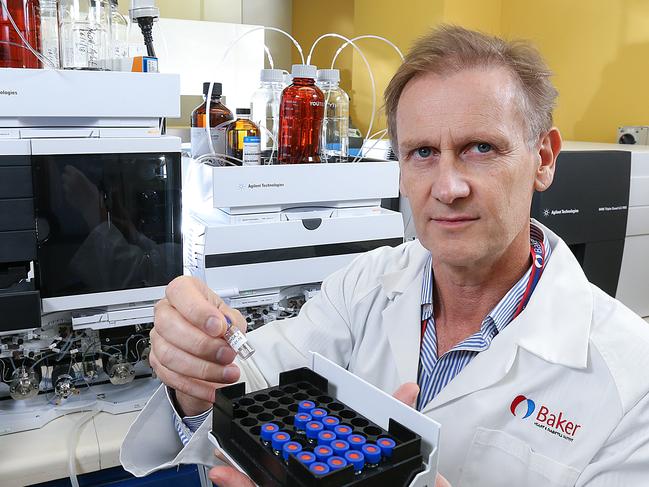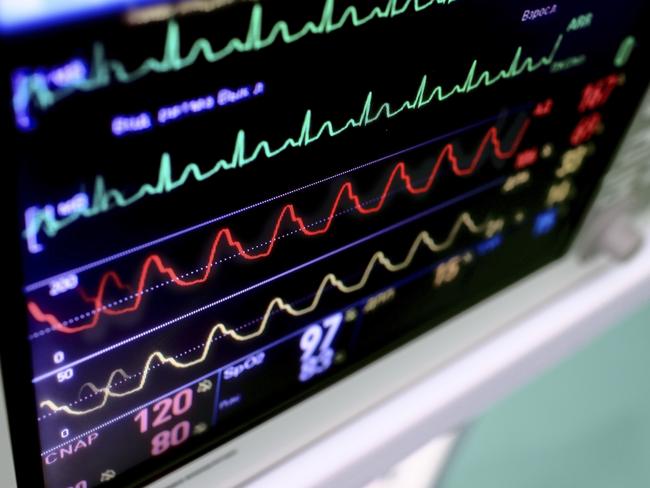World-first Melbourne made blood test predicts heart attack, stroke risk
Melbourne scientists have developed a world-first blood test that can predict the risk of heart attacks and strokes in patients.
Victoria
Don't miss out on the headlines from Victoria. Followed categories will be added to My News.
Melbourne scientists have developed a revolutionary new blood test set to save lives by identifying thousands of Australians not on the radar for a heart attack or stroke.
The world-first test will, says scientist Peter Meikle, prevent many having potentially fatal cardiovascular events.

An AI tool, the blood test was developed by a team from the Baker Heart and Diabetes Institute and La Trobe University with funding from the National Health and Medical Research Council and the Heart Foundation.
The research is being led by Professor Meikle, head of the Metabolomics Laboratory at the Baker Institute.
He says approximately two million Australian adults would be classified as having an intermediate risk of a cardiovascular disease, but unlike those considered high risk their treatment often varies and is typically not as aggressive.
Alarmingly, around 150,000 people in the group will go on to have a coronary event within the next five years.
Professor Meikle says clinical trials of the blood test will start in Australia next year with the expectation it will be on the market by late 2026 as a standard test for adults when they have regular heart health checks.
“We’re going to build up the evidence that this works and is cost effective,” he said.
“Then we will work towards translation and implementation both nationally and internationally.”
Professor Meikle says one Australian suffers a heart attack every 10 minutes, many without prior warning.

The blood test is based on lipids, which are fats in the blood, and predicts those in the intermediate risk group who should be moved into the high risk category and treated with more aggressive clinical intervention.
He says people at high risk are treated with cholesterol-lowering drugs such as statins or those that lower blood pressure.
“Low risk is managed with lifestyle,” Professor Meikle said.
“The intermediate risk group is where it can be somewhat ambiguous. There are guidelines for intermediate risk management but these are not as aggressive as those for high risk and often patients do not take the risk as seriously.”
He says while approximately 40 per cent of adults in Australia who have heart attacks are in the high risk category, 30 per cent have been classified as intermediate and 30 per cent as low risk.
“If we reclassify those people into the high risk group and they get aggressive treatment, we can potentially avoid that heart attack in that individual,” Professor Meikle said.
On Tuesday the team published the results of their research in the Journal of the American College of Cardiology.

“The value of this new tool is better prediction,” Professor Meikle said. “We’re not trying to replace the existing clinical pathway, we’re trying to improve it and to add on to that.”
Uniquely, the test has been designed to measure a set of about 250 lipids from one blood sample. Cholesterol is just one lipid in the blood. It is deposited into the arteries and builds up as plaque.
“But there are many other lipids that are involved in inflammation and oxidative stress,” Professor Meikle says.
He says the test may also help health professionals to streamline the selection of at-risk people who should undergo non-invasive imaging such as Coronary Artery Calcium Scoring.
“This approach aims to ensure that we are making efficient use of our health resources and that resources are directed at those who really need them, including treating those at high risk while avoiding over-treating those who don’t need it,” Professor Meikle says.
More Coverage
Originally published as World-first Melbourne made blood test predicts heart attack, stroke risk




